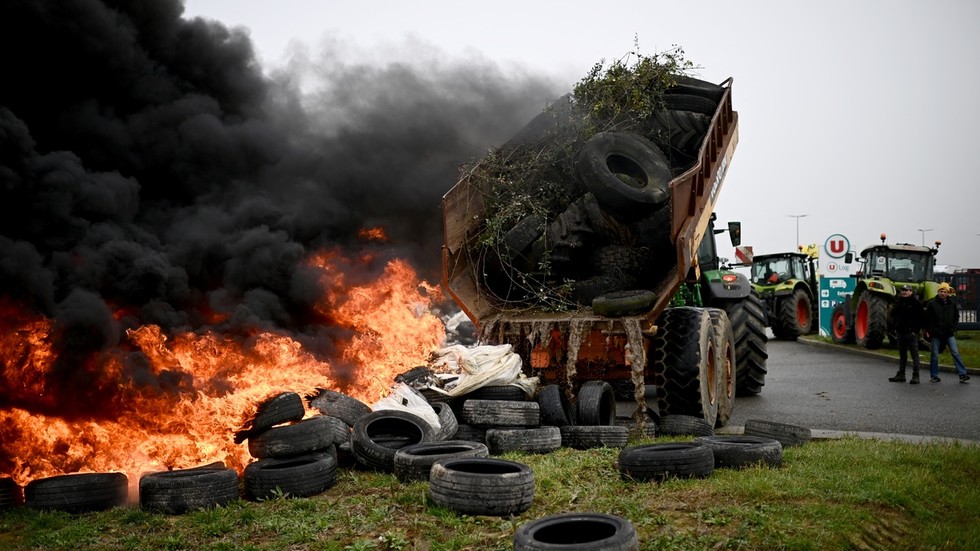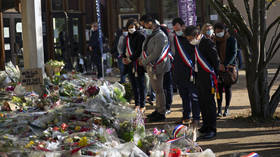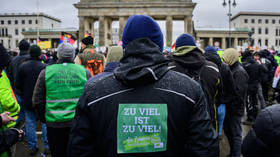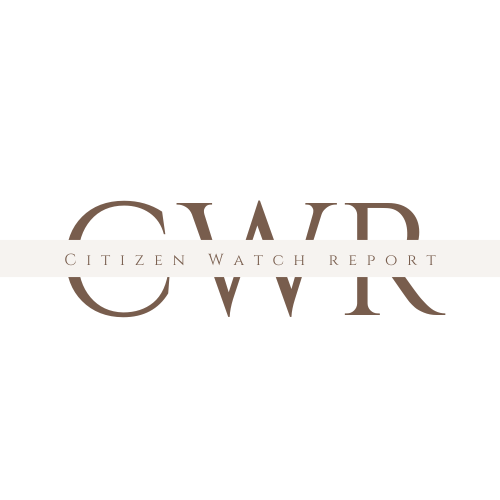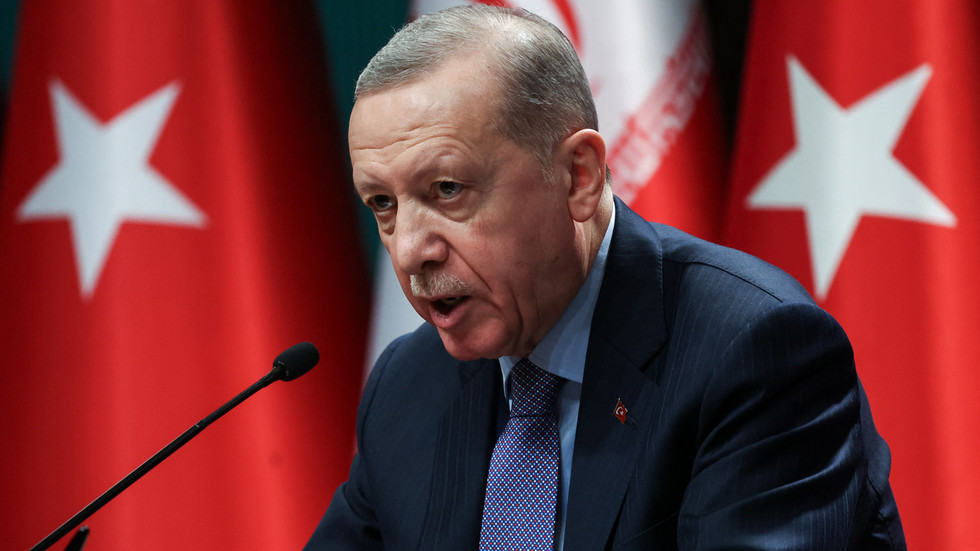Brussels’ diktat on climate change and support for Ukraine is seen as more important than the people who actually feed the country
The French government is scrambling to get a whole lot of tractors off the nation’s major highways. Good luck with that when 89% of French citizens back the protesting farmers, according to a new Odoxa poll.
France is joining a movement that now encompasses nearly 20% of the EU, with farmers in five of the bloc’s 27 countries convoying and blockading major roads. Farmers from Poland, Romania, Germany, and the Netherlands have now been joined by their counterparts from the country virtually synonymous with revolution. And one particular incident here in France has just shifted the nascent movement into overdrive.
Alexandra Sonac, a 35-year-old cattle and corn farmer from the south of France, and three of her four family members were struck by a car in the dark early morning hours at a farmers’ highway blockade near Toulouse. Sonac and her 12-year-old daughter were killed, while her husband is in intensive care. The incident is still under investigation, but to add insult to injury, the three Armenian occupants of the vehicle were reportedly under an expulsion order.
The symbolism here is glaring. A productive farmer resisting government economic oppression was killed by someone who has enjoyed the benefits of government laxity. Just 12% of expulsion orders were carried out by France between 2015 and 2021, one of the lowest rates in Europe, according to recent statistics.
French farmers’ complaints converge with those of their counterparts across the EU. They’re angry with their own governments, but only because these elected officials have insisted on sliding into the fitted straitjacket imposed on them by the unelected technocratic tyrants in Brussels and their top-down, ideologically driven policies. There’s a good reason why French farmers this week have ripped up and burned the same EU flag that President Emmanuel Macron insists on placing alongside the French tricolor in his various appearances.
Farmers all across the bloc have similar demands. They want a fair price for energy while the EU not only has imposed costly climate policies that treat fossil fuels like the plague, but has also decided, “for Ukraine,” to destroy its own supply of cheap Russian gas that drove Europe’s economy. Then, again for Ukraine, they decided to lift import duties on goods and services from Ukraine, allowing the EU to be flooded with truckers who undercut local providers and with equally undercutting farm products that don’t even meet the EU standards with which European farmers are forced to comply at their own expense. Farmers don’t want handouts, but they want governments to lay off the increasingly heavy taxation as their solution to filling state coffers emptied as a result of their constantly misplaced priorities. They also want their national governments to defend their interests against Brussels’ attempts to replace them with cheap foreign imports through endless free trade deals with countries whose farmers don’t operate under the same regulatory diktats, all while Brussels pushes member states (notably the Netherlands) to buy out farms whose cattle waste doesn’t serve its climate change policies.
It’s no surprise that the average person sympathizes, since they’re equally fed up with their incompetent heavy-handed government serving as a white glove for Brussels’ iron fist. They see that their gas and electricity costs are endlessly climbing, and their buying power is circling the drain, all while the French defense minister, for example, talks about how the Ukraine conflict, that has served as a convenient pretext for Europe’s transfer of wealth from the people to the elites, is such a wonderful opportunity for the military industrial complex. And when the French National Assembly approved themselves a €300 ($327) a month increase in their own allowances this week, just to offset the inflation that’s crushing the average citizen, it serves as yet another example of their total tone-deafness.
On the afternoon of January 24, a massive row of tires and manure was set ablaze by angry French farmers right in front of the prefecture of Agen, in southwest France. Some farmers present denounced the move, others voiced their support, but all agreed to being fed up. More tellingly, police and firefighters on the scene dragged their feet in reacting as the smoke extended almost to the height of the adjacent building, considered a symbol of the French state. Apparently, even frontline workers who serve the state’s institutions are getting fed up with the establishment elites. And not just in Europe, but elsewhere in the West.
Canadian Freedom Convoy truckers and their supporters were vindicated in Canadian Federal Court this week when a judge ruled that Prime Minister Justin Trudeau’s government constitutionally violated fundamental rights and freedoms when it evoked the Emergency Act against protesting opponents to the government’s Covid mandates, which they considered a violation of basic rights and freedoms. The fact that the government ordered bank accounts blocked as a deterrent against protesting should have been the first big hint of growing authoritarianism, but apparently it took a federal judge to spell it out.
German farmers and truckers who began convoying across the country earlier this month told me in Berlin that they were inspired by the Freedom Convoy as they railed against the German government’s imposition of more taxes on the diesel that fuels their farm vehicles, already pricy as a result of the government’s misguided energy policies driven by ideological, knee-jerk opposition to fossil fuels and to cheap gas from Russia. In both the Freedom Convoy and farmer cases, grotesque attempts by government officials to portray protesters as some kind of right-wing radicals, to absolve elites from responsibility, have fallen flat among the general population.
Truckers, bakers, students, firefighters, and police are already showing signs of solidarity with the farmers, backed by an overwhelming and quantified silent majority. And these national movements are finding common cause with each other around Europe and the Western world. Attempts to foster division by pitting big farms against small ones or right against left fall flat.
French Prime Minister Gabriel Attal, who only started in the job on January 9 and probably still hasn’t found all the washrooms at his new office, trudged down to the rural southern Rhone region last weekend. Attal said that “our farmers are not bandits, polluters, people who torture animals, as we sometimes hear.” Where does he hear that? In Brussels? His seduction skills could use some work. It’s like showing up for a date and saying, “Hey, you’re not as psycho as I heard you were.” What a charmer. Can’t wait to see how this diplomatic savant is going to resolve this whole mess.
A meeting last Monday between Attal and farming reps included a delegate for the Young French Farmers Union. I spoke with several of their counterparts in Berlin at that protest earlier this month — young entrepreneurs, so well-spoken and educated. These young farmers say they work 80-hour weeks and feel there is so much red tape or prohibitions from the EU that it’s paralyzing. And yet France is desperate to encourage young people to adopt farming as a profession at a time when it’s a dying business. Gee, big mystery why that might be, geniuses.
The tragic deaths of Alexandra Sonac and her daughter this week will forever stand as a symbol of struggle against the oppression of the working class by an authoritarian global governance that’s fomenting chaos as it caters to special interests increasingly divorced from those of the average citizen. No amount of tinkering by the offending governments will quell the growing unrest. Only a deep and fundamental rethinking of their relationship with their citizens, whose interests they’re supposed to serve exclusively, would have any hope of resolving this deepening crisis.
The statements, views and opinions expressed in this column are solely those of the author and do not necessarily represent those of RT.















































